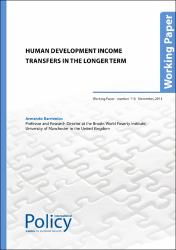Please use this identifier to cite or link to this item:
https://repositorio.ipea.gov.br/handle/11058/15401Files in This Item:
| File | Description | Size | Format | |
|---|---|---|---|---|
| en_IPCWorkingPaper116.pdf | 218.99 kB | Adobe PDF |  View/Open |
| Title: | Human Development Income Transfers in the Longer Term |
| Authors: | Barrientos, Armando |
| Abstract: | In the remarkable expansion of anti-poverty transfer programmes in developing countries in the last decade, human development income transfer programmes, popularly known as conditional cash transfers, have played a very significant role. Human development income transfer programmes have been implemented in the majority of countries in the Latin America and Caribbean region. They have also spread to countries in Africa, the Middle East and Asia. Their core feature combines income transfers to households in poverty with measures to facilitate investment in human development, particularly among children. The innovations associated with their design and implementation and the growing evidence base on their effectiveness have attracted the attention of international organisations and national governments. It is fair to say that human development income transfer programmes dominate current anti-poverty policy discussions within the international development community, polarising opinion in ways that other types of anti-poverty transfers — for example, non-contributory pensions or employment guarantees — fail to do. (…) |
| metadata.dc.rights.holder: | International Policy Centre for Inclusive Growth United Nations Development Programme |
| metadata.dc.rights.license: | O texto e dados desta publicação podem ser reproduzidos desde que as fontes sejam citadas. Reproduções com fins comerciais são proibidas. |
| metadata.dc.type: | Working Paper |
| Appears in Collections: | Publicações do IPC-IG |
Items in DSpace are protected by copyright, with all rights reserved, unless otherwise indicated.

